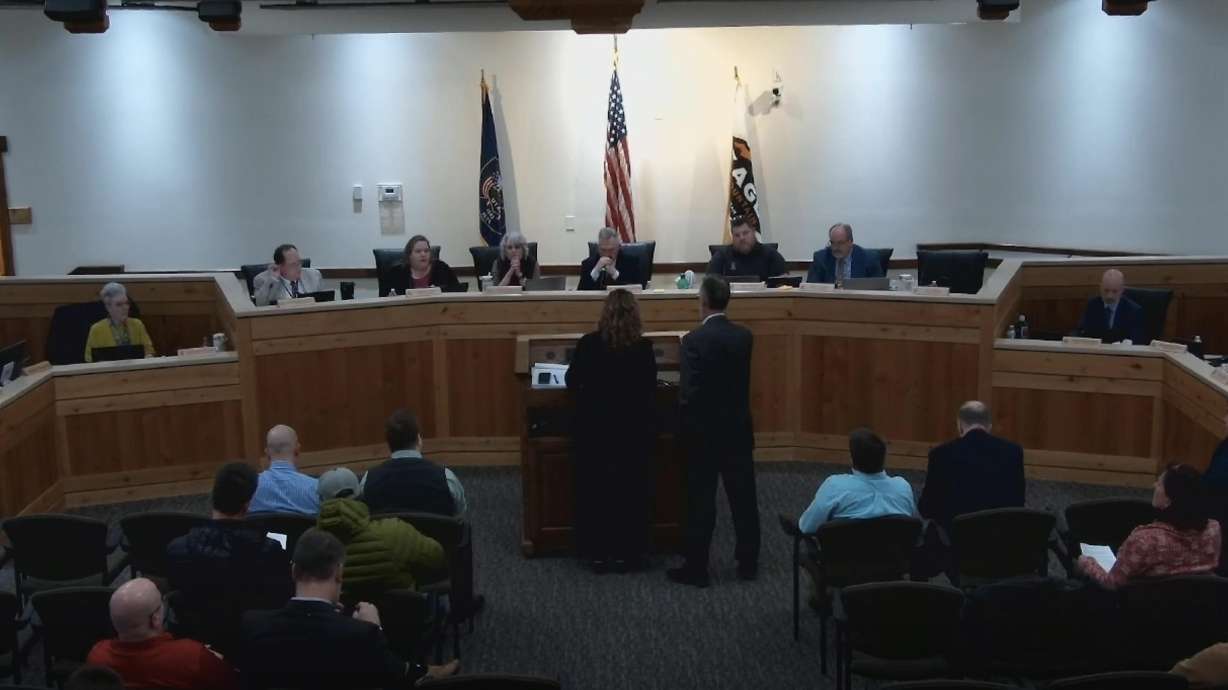Estimated read time: 5-6 minutes
- Eagle Mountain City Council postponed discussions on code amendments for nuclear reactors.
- Public opinion is divided, with safety concerns and support for nuclear energy debated.
- A town hall will be held to further explore energy alternatives and community input.
EAGLE MOUNTAIN — The Eagle Mountain City Council decided Tuesday not to act yet on code amendments allowing for nuclear plants and other energy production projects in the city.
The code amendments would allow battery energy storage systems, natural gas power plants, solar energy projects, electrical substations, power lines and small modular nuclear reactors to be approved in areas in the city's regional, technology, and industry overlay zone.
All but the substations and power lines would only be permitted through special use, meaning they have additional requirements to meet before the city would consider approval. The amendments would also allow power lines in agriculture zones.
The amendments were first brought up in a December planning meeting, during which the commission tabled the discussion so its members could learn more. Since then, several city leaders toured a natural gas power plant in Vineyard and spoke with people from the Idaho National Laboratory on renewable energy research.
"We have an energy issue in our city and state and in our country," city planning director Brandon Larsen said. "We are in a spot where we are looking for more energy."
Other types of power sources could facilitate growth and improve the economic vitality of the city, Larsen said.
The amendments would allow for energy projects to be proposed, but Larsen assured that any proposed projects would still face layers of scrutiny at federal, state and city levels before receiving approval. If a nuclear project even got approved, it would be years before one would be built, he added.
The changes would ensure power redundancy, which provides backup power services to ensure power remains uninterrupted, and diversify the local energy generation needs. Larsen said this could help the city establish itself as a leader in clean energy production and aid the local economy by providing jobs.
The city's planning commission recommended denial on the amendments on Jan. 14, citing safety concerns and suggesting it should be a regional collaborative decision with the county and nearby cities.
On Tuesday, during a nearly four-hour meeting, the City Council voted unanimously to table the discussion further. Mayor Tom Westmoreland suggested following the Legislature during this year's session — which started Tuesday — as some proposed bills could drastically impact the discussion, affecting the city's decision.
An uncertain future of energy
Enyo Energy initiated the amendment proposal and submitted an application to build a battery energy storage system that utilizes solar. Enyo's application is the only energy proposal the city has received so far related to the energy amendments.
All future energy projects in Eagle Mountain require the ability to cool their systems without using water, economic development director Evan Berrett said. With only so much water to go around, he said, the residents need to have priority.
Changing code could give the city control and oversight on projects and the authority to dictate development requirements, Berrett said.
Westmoreland said Eagle Mountain is behind in energy, and with the city growing so quickly, it's crucial to look for energy solutions. He worries what happens when the demand for electricity starts outpacing production and fulfillment.
The mayor said while there are still a lot of unknowns, he is trying to put the city in the best position so it can have some control over the future of the community's energy. Tuesday's meeting is "just the beginning" of the city's discussion on energy solutions, he said.
Split public opinion
During prior planning meetings, the public seemed largely against the amendments, specifically with the small nuclear reactors. In the last few weeks, a petition against the amendments has gained 400 signatures, and a website was even created opposing nuclear reactors in the city.
But comments during Tuesday's meeting were split on the decision. Dozens of residents showed up to the meeting to share their opinions.
Many residents said they want energy solutions, but they are concerned about the risk nuclear energy presents and how it could affect the community.
"We deserve to know what will happen to us," Reagan Peck said.
Carmen Valdez said including nuclear reactors in the amendments is risky for the community and should be taken out. Some residents questioned where the nuclear waste would be stored and how that could impact the environment.
"It just needs to be done in a safe way," 21-year-old Dallin Hubbard said. Although he isn't against nuclear reactors, he worries about the location and the risk involved if one is built close to residential areas.
Joy Rasmussen spoke strongly against the amendments, saying it isn't smart to "embrace radiation" from the nuclear plants. She is concerned there are not enough regulations for the "experimental" power production and that the danger is much higher with nuclear than any other generation type.
Others voiced their endorsement of nuclear energy. Steve Ellis, who is part of Operation Gigawatt, said salt reactor systems are "intrinsically safe" and the state is taking this topic very seriously in regards to regulations.
Resident Drew Curley said nuclear energy is safe, clean and reliable, and that the amendments should go further to allow full-scale nuclear reactors.
BYU engineering professor Matthew Memmott conducts research in nuclear and shared his approval of allowing nuclear plants, advocating for the reliability and safety. Multiple chemical engineers also spoke in favor during the meeting.
The council decided it will host a town hall in the near future so leaders can gather informally with citizens and have deeper discussions about the viability of energy alternatives in the city.










